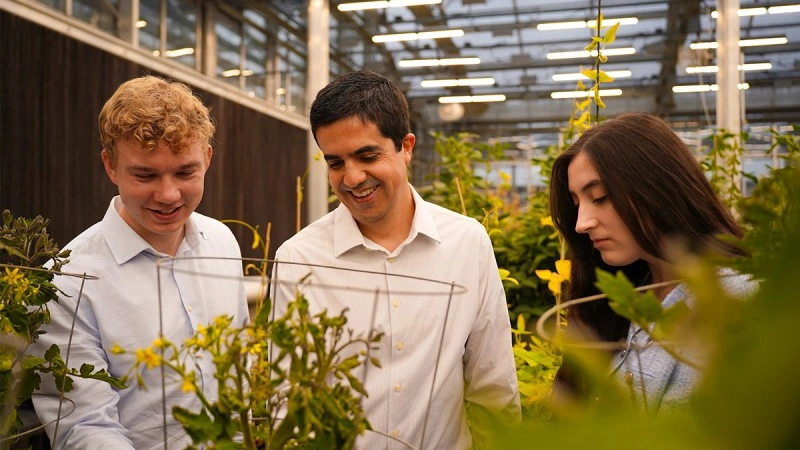
by | Dec 22, 2024
SHARE
From: The Donald Danforth Plant Science Center
The Donald Danforth Plant Science Center and Enhanced Nature (EN), together with its parent company Symbiotic Sciences (SS), announced a joint program to develop methods to accelerate and optimize the in vitro growth of AMF (arbuscular mycorrhizal fungi) for more sustainable agriculture. The project is led by Armando Bravo, PhD, assistant member at the Danforth Center. Dr. Bravo’s field of expertise is the symbiotic relationship between AMF and plant roots. His counterpart is Shouvik Chowdhury, VP Product Development and Strategy at EN, who also manages the EN and SS AMF production facility in Delhi, India.
FEATURE IMAGE: Armando Bravo, PhD, assistant member at the Danforth Center and two lab members in a greenhouse. Credit: Danforth Plant Science Center.
AMF live underground in tight association with plant roots, where they help plants take up nutrients like phosphorus and nitrogen from the soil, and to tolerate environmental stress. In exchange, plants return essential carbon-containing compounds that allow the AMF to live and grow. About 70% of all plants naturally form symbiotic relationships with AMF, and AMF is recognized as a key organic component contributing to more sustainable and profitable agriculture practices. AMF sales worldwide have been projected to grow over the next 8 years at 10-15% annually (CAGR).
“Although AMF’s benefits to plants have been known for decades, widespread agricultural adoption has remained limited due to inefficient production methods,” said Bravo. “Recent breakthroughs in AM symbiosis research could enhance our ability to cultivate AMF more effectively. These advances not only deepen our understanding of AMF’s functions but also offer practical applications for improved fungal production. Just like the symbiotic relationship between AMF and plants, this collaboration will benefit both Symbiotic Sciences and the Danforth Center by advancing basic science and sustainable agricultural practices.”
“For the last 15 years we have been operating one of the largest AMF production facilities in the world,” said Chowdhury. “As we have developed our proprietary methods, we have come to appreciate the complexity of culturing AMF at scale. Since EN has begun selling a variety of AMF products to the market we have observed a rapid increase in demand. Supply of high quality AMF is limited, so methods to increase production efficiencies without compromising quality are clearly needed. We are truly excited to partner with Dr. Bravo and the Danforth Center, as we believe this collaboration will open up innovative pathways to enhance production efficiency and scalability. We hope to collaborate with Danforth on other projects to facilitate the adoption of AMF in agriculture.”
About The Donald Danforth Plant Science Center
Founded in 1998, the Donald Danforth Plant Science Center is a nonprofit research institute with a mission to improve the human condition through plant science. Research, education and outreach aim to have an impact at the nexus of food security and the environment, and position the St. Louis region as a world center for plant science. The Center’s work is funded through competitive grants from many sources, including the National Science Foundation, National Institutes of Health, U.S. Department of Energy, the Bill & Melinda Gates Foundation, and through the support of individuals and corporations. Learn more at danforthcenter.org
About Enhanced Nature
Enhanced Nature (EN) drives the future of bionutrition, harnessing the power of concentrated AMF (arbuscular mycorrhizal fungi) to the ultimate benefit of farmers and growers around the world. Backed by the pioneering expertise and robust foundation of Symbiotic Sciences—an innovator in AMF research and large-scale production—EN delivers on its promise of “Nature, Enhanced”. EN supplies the highest quality AMF-based bionutrients to bionutrient suppliers, retailers, and wholesalers.
The post New collaboration aims to optimize crop nutrient uptake and tolerance to environmental stress for more sustainable agriculture first appeared in the The Donald Danforth Plant Science Center Newsroom.
SHARE
